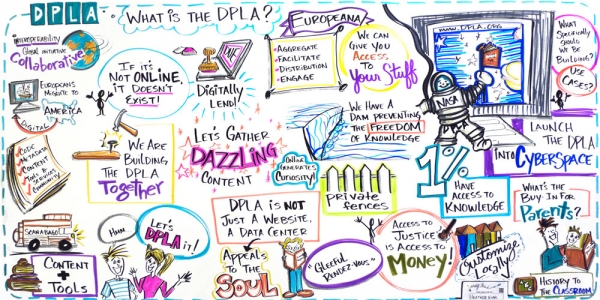The Digital Public Library of America
The Digital Public Library of America (DPLA) is an initiative that has the goal to make the cultural and scientific heritage of humanity available, free of charge, to all. Where Google Books is caught up in an everlasting legal battle, a group of Harvard-led scholars have decided to launch their own project to put all of history online.

When Google launched its Google Books project in 2004 with the goal to scan all the world’s books into its database, it was both praised and critisised heavily. Praised for its bold attempt to make it technically possible to digitise books on a scale never seen before. Critisised over the fact that a private company would control all of the worlds knowledge. In 2008, after being sued for copyright infringement for years, Google agreed to pay large sums to authors and publishers in return for permission to develop a commercial database of books. Under the terms of the deal, Google would be able to sell subscriptions to the database to libraries and other institutions while also using the service as a means for selling e-books and displaying advertisements. This led to even more controversy and several authors and libraries demanded to be excluded from Google’s database.
In a response to this, Robert Darnton, one of the biggest critics of Google Books, proposed to build a true ‘digital public library of America’ which would be ‘truly free and democratic’. Here, libraries and universities would work together to establish a distributed system aggregating collections from many institutions. Harvard’s Berkman Centre of Internet and Society accepted Darton’s ideas and is incubating it now. The project has several similarities with that other project that comes forth out of a response to Google Books: Europeana, and the two giants have already forged partnerships. Google still has to decide what their next steps are.
The vision of the DPLA is to provide one click access to many different resource types, with the initial focus on producing a resource that gives full text access to books in public domain, e.g. from Hathi Trust, the Internet Archive, and U.S and international research libraries. Most of its board members, including Brewster Kahle from the Internet Archive, favor a de-centralised network of different public libraries instead of building a centralised organisation which is responsible for all of its content, but this is still being discussed
In April 2013 the Harvard funded research program ends and the digital library has to be operational. A lot of progress has been made in the last year by organising several meetings and workshops and many volunteers have been recruited. Still, there are a lot of obstacles that have to be overcome.
As Google has also noticed, the technical implementation is not the hardest part, it is the copyright. Today, copyright for a work extends for 70 years after the death of the author and is applied by default to any created work. This means that it is now almost impossible to publish a work from the last century. Even when the copyright holders either are unknown or can’t be found, so called ‘Orphan Works’, the work can not be published online because the copyright law was automatically applied on all works retroactively, so without the copyright holder having to register it.
Many copyright experts argue that without a proper revision of the current copyright act, it will be very hard to include these orphan works in a digital database. Robert Danton however, believes that Congress might grant a non-commercial public library the right to digitise orphan books, which would make thousands of books available and an enormous step forward in the copyright debate.
The Digital Public Library is an ambitious project with great promise. In the next year they will continue to address the challenges that lie before them. A daunting task but with a potentially great outcome, where everybody with an internet connection can enjoy millions of books from America’s history.
